Come August 2019, the Seat of Government—Jubilee House would be powered by solar energy.
According to the President, Nana Akufo-Addo, this is part of plans by government to convert to renewable energy and to reduce expenditure on utilities.
Delivering the 2019 State of the Nation Address to Parliament yesterday, he said government’s target is to install up to 200 megawatts of distributed solar power by 2030 in both residential and non-residential facilities.
This, he believes, will reduce government’s liabilities to the Electricity Company of Ghana (ECG).
“Renewable energy has also become a necessary addition to our energy sector because it has increasingly become cheaper, and is key to the implementation of our international obligations under Sustainable Development Goal 7, on access to affordable, reliable, and sustainable energy, as well as Sustainable Development Goal 13, on urgent action to combat climate change,” he noted.
Other government agencies and ministries are expected to follow suit after Jubilee House’s solar panel installation.
In pursuance of the solar energy drive, the Ministry of Energy has also initiated the Solar Rooftop Programme. The Ministry is leading by example with the installation of a 65-kilowatt solar rooftop system at its premises
With this system in place, the government is indeed sure of achieving an electricity generation mix that ensures diversity and security of energy supply.
Nana Akufo-Addo said, “We will continue to promote the deployment of renewable energy in line with our policy target of 10% renewables in the energy mix from the current 1%.”
Another justification for renewable energy according to the president is to ensure that every part of the country has access to energy—especially those on islands and lake sides that cannot be reached through the national grid.”
The President revealed that there are over 200 islands and 2,000 lake-side communities that require mini-grids from renewable sources to meet their energy needs.
Ghana’s Gas
Still on affordable and reliable energy, Nana Akufo-Addo said the country’s gas production level had tripled during the year, from 100 to 300 million cubic feet per day.
He added that government is undertaking practical steps to remove the transmission bottlenecks, to ensure that Ghanaian gas can reach power plants located in the eastern part of the country.
“I am confident that, by August this year, the situation would have been fully remedied to ensure Ghana uses locally produced gas for the bulk of its thermal power generation, saving substantial amounts of foreign exchange on imported fuels,” he said.
By Grace Ablewor Sogbey
[email protected]




Comments are closed.